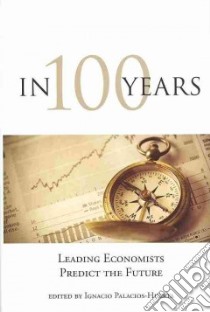- Libreria
- >
- Libri in lingua
- >
- Economia, finanza e management
- >
- Econometria
In 100 Years - 9780262026918
Un libro in lingua di Palacios huerta Ignacio (EDT) edito da Mit Pr, 2014
- € 23.50
- Il prezzo è variabile in funzione del cambio della valuta d’origine
This pithy and engaging volume shows that economists may be better equipped topredict the future than science fiction writers. Economists' ideas, based on both theory andpractice, reflect their knowledge of the laws of human interactions as well as years ofexperimentation and reflection. Although perhaps not as screenplay-ready as a work of fiction, theseeconomists' predictions are ready for their close-ups. In this book, ten prominent economists --including Nobel laureates and several likely laureates -- offer their ideas about the world of thetwenty-second century. In scenarios that range from the optimistic to the guardedly gloomy, thesethinkers consider such topics as the transformation of work and wages, the continuing increase ininequality, the economic rise of China and India, the endlessly repeating cycle of crisis and(projected) recovery, the benefits of technology, the economic consequences of political extremism,and the long-range effects of climate change. For example, Daren Acemoglu offers a thoughtfuldiscussion of how trends of the last century -- including uneven growth, technological integration,and resource scarcity -- might translate into the next; 2013 Nobelist Robert Shiller provides aninnovative view of future risk management methods using information technology; 2012 Nobelist AlvinRoth projects his theory of Matching Markets into the next century, focusing on schools, jobs,marriage and family, and medicine; 1987 Nobelist Robert Solow considers the shift away fromremunerated labor, among other subjects; and Martin Weitzman raises the intriguing but alarmingpossibility of using geoengineering techniques to mitigate the nevitable effects of climate change.In a 1930 essay mentioned by several contributors, "Economic Possibilities for OurGrandchildren," John Maynard Keynes offered predictions that, read today, range from absolutelycorrect to spectacularly wrong. This book follows in Keynes's path, hoping, perhaps, to better hisaverage.
Informazioni bibliografiche
- Titolo del Libro in lingua: In 100 Years
- Sottotitolo: Leading Economists Predict the Future
- Lingua: English
- Autori : Palacios huerta Ignacio (EDT)
- Editore: Mit Pr
- Collana: Mit Pr (Hardcover)
- Data di Pubblicazione: 07 Febbraio '14
- Genere: BUSINESS and ECONOMICS
- Argomenti : Economic development Forecasting
- Pagine: 195
- Dimensioni mm: 228 x 152 x 0
- ISBN-10: 0262026910
- EAN-13: 9780262026918


